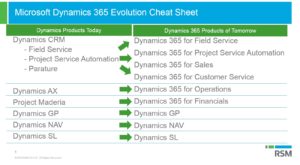You may be wondering what the difference is between Microsoft Dynamics 365 for Operations, Microsoft Dynamics 365 Enterprise Edition, and Microsoft Dynamics 365 Business Edition. Well, I know there is a lot of confusion about all these new Dynamics 365 products and names, and I want to take this opportunity to help demystify things and help you understand what all of these words mean. The good news is that there is a pretty simple explanation.
First, I will explain the six products that make up the product suite of Dynamics 365, and then I will explain the two licensing models that allow you to purchase the Dynamics 365 products.
Dynamics 365 Product Suite
Power Apps
Microsoft PowerApps is a new business application platform that allows you to develop new, sophisticated business applications combining the automation capabilities of Microsoft Flow and the analytics of Power BI. You can use this new platform to build cloud- and mobile-ready apps that leverage the Common Data Model (CDM) and capture and organize business data in a central cloud location. You can also seamlessly extend PowerApps with Azure services. You can learn more about PowerApps here.
PowerApps Topology Diagram: Source
Microsoft Dynamics 365 for Sales
The new Microsoft Dynamics 365 for Sales business application is a subset of what we used to know as Dynamics CRM. The Sales application allows you to automate your sales processes to help you increase your revenue, boost productivity, and gain key insights while reducing costs. This includes CRM functionality such as quotes, orders, and products. You can learn more about Microsoft Dynamics 365 for Sales here.
Microsoft Dynamics 365 for Field Service
The new Microsoft Dynamics 365 for Field Service business application is another subset of what we used to know as Dynamics CRM. The Field Service application allows you to keep your customer at the center of your business by providing functionality such as dispatching, services, and service activities features from Dynamics CRM. You can learn more about Microsoft Dynamics 365 for Field Service here.
Microsoft Dynamics 365 for Customer Service
The new Microsoft Dynamics 365 for Customer Service business application is a third subset of what we used to know as Dynamics CRM. Using these features you can help ensure that every interaction matters and that you are delivering quality customer service. You can use the features to help earn loyalty, empower your customer service agents, and stay agile with a single unified customer experience. This application brings you features such as case management, customers, and contacts that you are familiar with in Dynamics CRM today. You can learn more about Microsoft Dynamics 365 for Customer Service here.
Microsoft Dynamics 365 for Project Service Automation
The new Microsoft Dynamics 365 for Project Service Automation business application is another subset of what we used to know as Dynamics CRM. This application provides project-based organizations a single system of engagement for sales, resourcing, delivery, and billing. You can learn more about Microsoft Dynamics 365 for Project Service Automation here.
Microsoft Dynamics 365 for Operations
The new Microsoft Dynamics 365 for Operations business application is what we know today as Microsoft Dynamics AX. This business application brings all the functionality you know and require to run every aspect of your business including finance, human resources, inventory and warehouse management, and all the other features you have come to know and love. You can learn more about Microsoft Dynamics 365 for Operations here.
Microsoft Dynamics 365 for Financials
The new Microsoft Dynamics 365 for Financials business application is what is currently known as “Project Maderia” internally at Microsoft and externally for customers in the TAP program. The basis for this new product is a slimmed down version of what you know today as Dynamics NAV. However, it is important to note that it is not a replacement for Dynamics NAV. Microsoft Dynamics 365 for Financials helps make ordering, selling, invoicing and reporting easier and faster for small and mid-sized businesses that do not require all the functionality of Dynamics AX or Dynamics 365 for Operations. You can learn more about Microsoft Dynamics 365 for Financials here.
Microsoft Dynamics 365 for Marketing +Adobe
In addition to all the other products, Microsoft is partnering with Adobe to bring the power of the Adobe Marketing Cloud to Dynamics 365. The solution will bring true multi-channel marketing capabilities integrated directly into Dynamics 365 applications. You can learn more about Microsoft Dynamics 365 for Marketing here.
Summary of Dynamics 365 Products
So to recap what all these products are, I have put together a little graphic that shows the evolution of the current Microsoft Dynamics products and their names in Dynamics 365.

For more information about the Microsoft Dynamics 365 suite of products, contact our experts at RSM, or call 855-437-7201
by Rachel Profitt for RSM

 RSMUS.com
RSMUS.com